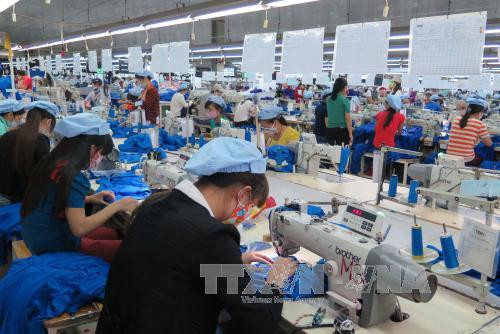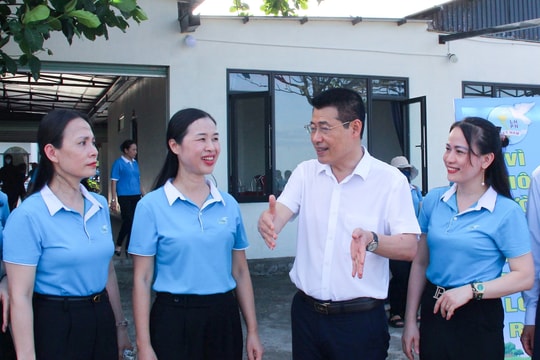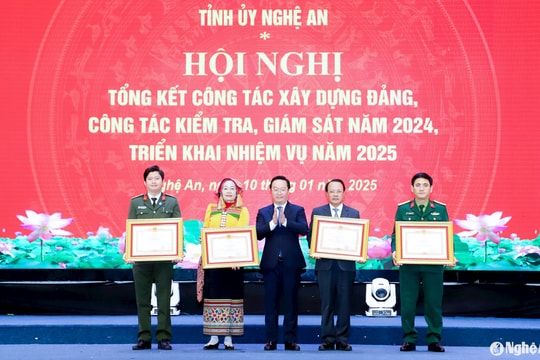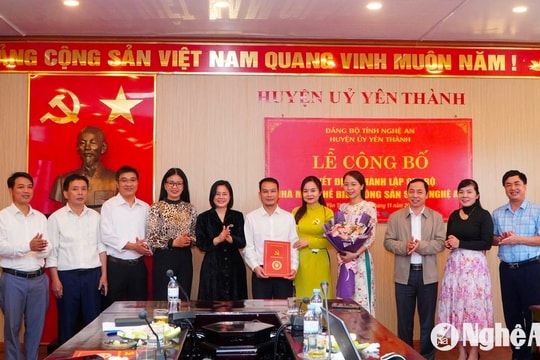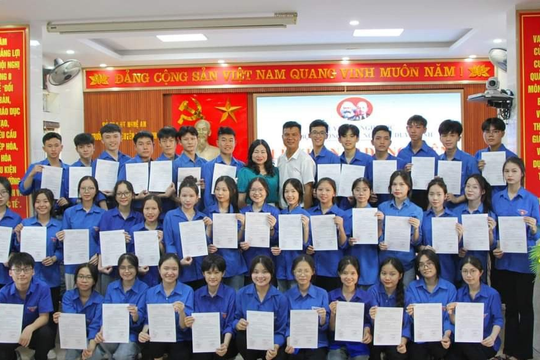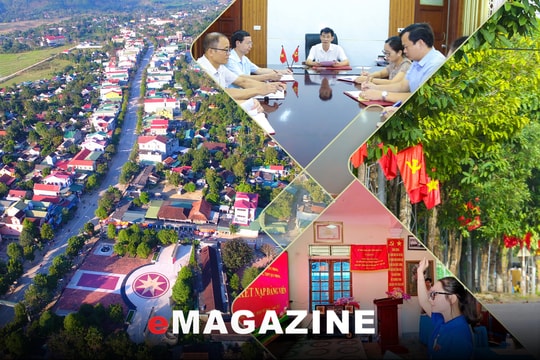Many solutions for party development in private enterprises today
Party development in private enterprises is an important task to build and consolidate Party organizations and enhance Party leadership in these enterprises during the period of accelerating industrialization, modernization, and international integration.
However, in reality, this has encountered many difficulties. In the coming time, there needs to be synchronous solutions so that the work of developing the Party in private enterprises can achieve the desired results.
The reporter had an interview with comrade Ha Ban, member of the Party Central Committee, Deputy Head of the Central Organization Committee on this issue.
Developing the Party in enterprises contributes to promoting enterprise development. Photo: Quoc Viet / VNA |
Could you tell us what the current situation of party development in private enterprises is like?
Implementing Conclusion No. 80-KL/TW, dated July 29, 2010 of the Secretariat (10th tenure) on continuing to promote the implementation of Directive No. 07-CT/TW of the Politburo (8th tenure), our Party and State have issued a fairly synchronous system of documents, creating a favorable legal corridor for building and consolidating party organizations in non-state enterprises, including private enterprises.
As of June 30, 2015, the country had 134,036 party members in non-state enterprises, an increase of 104,577 party members compared to December 31, 2008. There were 13,465 private enterprises with party cells (data up to December 31, 2015), accounting for 3.47% of the total number of enterprises (388,232 private enterprises). Of which, at joint stock companies and limited liability companies with less than 50% state capital, there were 9,032 party cells (including 1,907 grassroots party cells and 7,125 affiliated party cells); at private enterprises, there were 4,433 party cells (including 1,613 grassroots party cells and 2,820 affiliated party cells).
Many provincial and municipal Party Committees have focused on building Party organizations and developing Party members in private enterprises. For example, in 5 years, Hanoi established 748 new Party organizations and admitted 4,880 Party members; Lao Cai established 16 new Party organizations and admitted 238 Party members; Thai Binh established 127 new Party organizations and admitted 1,300 Party members...
Most provincial and municipal Party Committees have established Party Committees for enterprises directly under the provincial and municipal Party Committees. Localities with many industrial parks and concentrated export processing zones such as Ho Chi Minh City, Hanoi, Dong Nai, Hai Phong... have established Party Committees for industrial parks and export processing zones directly under the provincial and municipal Party Committees. Some districts have established Party Committees for non-state enterprises directly under the district and county Party Committees...
The number of party members doing private business has increased significantly. Before August 28, 2006, there were 35,235 party members doing private business nationwide, accounting for 1.09% of the total number of party members. By August 28, 2016, the number of party members doing private business nationwide was 125,675, an increase of 90,440 comrades (3.57 times higher than in 2006), accounting for 2.72% of the total number of party members.
What are the advantages and difficulties of developing party members in private enterprises, sir?
In general, party organizations in private enterprises have promoted their functions and tasks according to the Regulations of the Central Party Secretariat, promoted their role in educating political ideology for party members, and encouraged workers and laborers to implement internal rules, working regulations, and production and business plans of enterprises.
However, the work of developing the Party in private enterprises still has many shortcomings and limitations. The number of enterprises with Party organizations is still very small. The quality of activities of many Party organizations is not high, the leadership role of Party organizations is still vague. Party organizations in private enterprises often have few Party members, the Party cell activities are not regular, the quality of activities is low; attention is not paid to creating sources for Party members; the operating budget of Party organizations is still limited and depends on the support of business owners.
Along with that, the leadership and guidance of the superior Party Committees for the activities of Party organizations in enterprises have not met the requirements; many places have not issued specific guidance documents on Party activities and Party work in accordance with the specific conditions of enterprises.
The pilot program of admitting qualified private business owners into the Party in some places has not received due attention. Some enterprises only focus on production and business tasks, paying little attention to the work of developing Party members. Most workers and employees in enterprises only care about jobs and income, and are not eager to strive to become Party members. In addition, the frequent fluctuations in the labor force of enterprises are also a major obstacle to the work of admitting Party members and developing Party organizations.
Sir, what are the requirements and tasks for building and consolidating party organizations and developing party members in private enterprises today?
First of all, it is necessary to seriously and effectively implement the Conclusion Notice No. 22-TB/KL, dated April 11, 2017 of the Secretariat on continuing to implement Conclusion No. 80-KL/TW, dated July 29, 2010 of the Secretariat of the 10th tenure. Research and perfect the model of party organizations and mass organizations, ensuring the comprehensive leadership role of the Party over mass organizations in enterprises. Party committees and mass organizations need to review and grasp the situation and status of party organizations and mass organizations in private enterprises to propose tasks and solutions for appropriate construction and consolidation.
On the one hand, actively create sources for developing party members, establish new party organizations in non-state enterprises, including private enterprises. At the same time, focus on consolidating and improving the quality of activities of party committees and party cells in enterprises; focus on improving the quality of party cell activities associated with improving the production and business efficiency of enterprises, and pay attention to assigning tasks to party members.
Continue to do a good job of consolidating, developing and improving the quality of activities of mass organizations in enterprises. It is necessary to take care of building and improving the quality of cadres doing party and mass organization work in private enterprises, especially the team of party secretaries, party cells, union chairmen, women's union chairmen, youth union secretaries in enterprises...
Sir, in the coming time, what solutions are needed to promote the development of party members in private enterprises?
The Government Party Committee has directed the central ministries and branches to focus on implementing Resolution No. 35/NQ-CP, dated May 16, 2016 on supporting enterprise development until 2020, removing difficulties and creating conditions for enterprises to develop. This will be a prerequisite for establishing and developing party organizations in enterprises outside the state sector, including private enterprises.
Innovate propaganda work, regularly strengthen the Party building steering committee and socio-political organizations in enterprises. Conduct comprehensive surveys, grasp the number of Party members operating in private enterprises, assess the actual role of Party organizations, the quality of Party members in private enterprises, develop and promulgate resolutions, programs, plans for the period 2017 - 2021 and annual plans as a basis for directing and inspecting implementation.
Local Party Committees issue specific guidelines on the establishment of Party organizations and Party activities in private enterprises in accordance with the regulations of the Central Party Secretariat and local conditions. Guide Party organizations to improve the quality of Party members and train newly admitted Party members. Summarize the pilot policy of admitting qualified private business owners into the Party, study, supplement, amend and perfect the process of developing Party members, ensuring seriousness, not causing trouble but not loosening management.
Based on the summary of the implementation of Regulation No. 15-QD/TW, dated August 28, 2006 of the 10th Central Executive Committee on Party members doing private business, the Central Organizing Committee will advise the Politburo and the Secretariat on appropriate policies and solutions to build and consolidate Party organizations and develop Party members in non-state enterprises in general, including private enterprises. Review, study, amend and supplement regulations on the functions and tasks of grassroots Party organizations in all types of enterprises to suit current requirements, tasks and operating conditions.
The Government Party Committee directed the Ministry of Finance to guide the expenditures to support party organizations and socio-political organizations in non-state enterprises to serve their activities, which are considered expenses when determining taxable income according to the provisions of Clause 2, Article 6 of Decree No. 98/2014/ND-CP, dated October 24, 2014 of the Government.
Continue to research and develop regulations on allowances for Party cell members, costs for examination and admission to the Party, costs for training and fostering Party committees and newly admitted Party members in enterprises from the Party's budget to suit the current requirements for developing Party members in non-state enterprises.
Thank you very much!
According to News
| RELATED NEWS |
|---|

